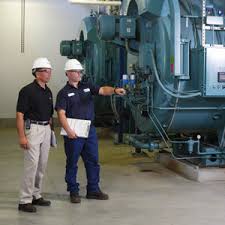What You Required to Find Out About the Principles of Boiler Training
When it comes to boiler training, comprehending the vital parts and their features is important for risk-free operation. Let's check out the basics that will equip you as a central heating boiler driver.
Comprehending Central Heating Boiler Parts and Their Features
Central heating boilers are complicated systems that rely upon different elements to work successfully and securely. Comprehending these elements is vital for any individual dealing with or around boilers. The burner ignites the gas, creating heat, while the heat exchanger transfers that heat to the water. The water degree control assures the central heating boiler preserves the appropriate water level, avoiding overheating.
The stress gauge allows you keep an eye on the pressure inside the boiler, which is essential for secure operation. The safety shutoff safeguards against too much pressure by launching heavy steam when required. An additional crucial element is the feedwater pump, which supplies water to the central heating boiler when needed.
Finally, the flue system eliminates combustion gases safely outside. Acquainting yourself with these components and their functions will certainly equip you to identify prospective concerns and preserve a secure operating atmosphere. Each part plays a critical function in the performance and security of the boiler system.
Relevance of Boiler Procedure Training
Boiler operation training is essential for making certain safety methods are followed properly, minimizing dangers in the office. You'll also find out how to take care of efficiency and energy usage, which can cause significant expense financial savings. By recognizing these essential facets, you can operate central heating boilers better and securely.
Safety And Security Procedures and Procedures
Understanding security protocols and treatments is important for any person included in boiler procedure training. By prioritizing safety and security, you're not just abiding with policies; you're advertising a culture of treatment and responsibility. This understanding empowers you to make educated choices and react promptly in emergencies, inevitably enhancing the dependability and efficiency of boiler procedures.

Performance and Power Management
When you prioritize efficiency and energy administration in boiler procedure training, you're not simply improving efficiency; you're additionally reducing operational costs and environmental impact. Understanding how to optimize fuel usage and implement advanced controls can lead to significant savings. You'll learn to recognize inadequacies, such as warmth loss or inappropriate stress settings, which can squander sources. By grasping energy management techniques, you'll be equipped to monitor system efficiency, making certain every little thing runs at peak effectiveness. Not only does this knowledge aid keep compliance with environmental regulations, yet it likewise increases your facility's reputation. Inevitably, efficient boiler training empowers you to make enlightened decisions that promote sustainability while decreasing costs, creating a win-win circumstance for both your organization and the planet.
Important Safety And Security Protocols for Central Heating Boiler Operations
When operating a central heating boiler, prioritizing security is essential. You need to put on personal protective tools, know the emergency closure treatments, and conduct routine tools evaluations. These crucial protocols not only maintain you safe but likewise warranty efficient boiler efficiency.
Individual Safety Equipment
While operating a central heating boiler, it's vital to focus on security by using the suitable Personal Safety Equipment (PPE) Hearing protection is additionally essential, as boiler procedures can be loud. By outfitting yourself with the best PPE, you significantly reduce your threat of injury and assure a much safer working environment while handling central heating boiler operations.
Emergency Closure Procedures
Despite the ideal Individual Protective Tools, understanding how to react in an emergency situation is vital for safe central heating boiler operation. Familiarize on your own with the emergency closure treatments specific to your central heating boiler system. Make sure every person in the vicinity is mindful of the circumstance. Find the emergency shutoff valve and run it promptly. Always comply with the manufacturer's guidelines to stay clear of errors. After closing down the boiler, screen for any leakages or uncommon conditions, and see to it all stress and temperature determines return to typical. As soon as risk-free, connect with your team and report the event to your manager. Frequently exercising these procedures keeps you ready and can considerably decrease threats throughout actual emergencies. Keep sharp, and prioritize security most of all.
Normal Tools Inspections
Regular equipment evaluations are vital for preserving risk-free central heating boiler procedures, as they aid recognize possible concerns prior to they rise right into severe issues. You'll intend to set up these inspections regularly to assure all parts work properly. Inspect for leakages, uncommon noises, and any type of indications of wear and tear. Inspect safety shutoffs, determines, and regulates to verify they're operating within specified restrictions. Do not fail to remember to examine the boiler's water level and stress setups. Keeping comprehensive records of evaluations can help spot fads and persisting problems, allowing you to take aggressive procedures. By prioritizing normal examinations, you not only enhance safety and security however also expand the life expectancy of your boiler. Bear in mind, a little diligence currently can stop costly fixings later on.
Upkeep Practices for Optimal Central Heating Boiler Performance
Efficient upkeep practices are necessary for guaranteeing optimal central heating boiler performance and durability. Beginning by checking water levels consistently to stop getting too hot and guarantee proper performance. Maintain an eye on stress gauges, and change setups as required to maintain efficiency. It's likewise vital to routinely clean heaters and warmth exchangers, as dust buildup can hinder performance and boost gas intake.
Don't forget to inspect safety shutoffs and gauges for correct procedure-- this maintains your central heating boiler risk-free and efficient. Arrange annual expert examinations to catch prospective concerns prior to they rise.
Ultimately, preserve a clear location around the central heating boiler to stop any kind of obstruction and promote simpler gain access to throughout upkeep. By adhering to these techniques, you'll not just enhance your boiler's performance yet additionally prolong its lifespan, saving you time and cash in the lengthy run. Routine maintenance is vital to keeping your system running smoothly.
Usual Central Heating Boiler Issues and Troubleshooting Strategies
When you rely upon your boiler for heat and warm water, it is essential to recognize usual issues that can arise and recognize exactly how to resolve them. One regular problem is an absence of heat, which might come from a malfunctioning thermostat or an published here obstructed radiator. Inspect both to verify they're operating correctly. If you see odd noises, like banging or gurgling, it might indicate trapped air or low tide levels; hemorrhaging the radiators or checking the stress look at this website gauge can assist. Leakages are one more concern-- check for any puddles or damp places around the boiler. If you locate one, it's best to close off the system and call a professional. If your boiler often closes off, it might be due to overheating or a defective part; resetting the system or checking for obstructions can often resolve this. Always focus on safety and security and speak with a professional when doubtful.
Governing Requirements and Conformity in Central Heating Boiler Procedures
Understanding regulatory standards and compliance in boiler procedures is essential for guaranteeing safety and efficiency. You need to familiarize on your own with neighborhood, state, and government laws that control central heating boiler operations. These requirements typically include guidelines for installation, upkeep, and examination, intending to stop mishaps and environmental harm.

Remaining compliant assists you stay clear of significant fines and legal concerns while promoting a risk-free functioning atmosphere. Maintain up-to-date with new guidelines and practices, as these can alter regularly. By focusing on compliance, you'll not just shield yourself however additionally your colleagues and the community at big.
Continual Education and Accreditation in Central Heating Boiler Training
Continual education and certification in central heating boiler training not just boost your technical skills however likewise assure you remain current with industry requirements and finest techniques. By taking part in ongoing training programs, you'll deepen your understanding of new innovations, safety and security methods, and governing changes. This proactive approach can improve your task performance and make you an important possession to your company.
Accreditation is a critical part of this procedure. It shows your dedication to professionalism and your competence in central heating boiler operations. Numerous employers choose or perhaps require certified experts, so acquiring these credentials can open up new job possibilities.
In addition, constant education assists you network with various other specialists in the area, sharing insights and gaining from their experiences. By purchasing your education and learning, you not just improve your skills yet likewise setting yourself for advancement in your job, guaranteeing you stay competitive in the ever-evolving central heating boiler market.
Frequently Asked Questions
What Credentials Do I Need to Begin Central Heating Boiler Training?
To begin central heating boiler training, you'll commonly require a senior high school diploma or matching. Depending upon your location, qualifications or instructions could be called for - Boiler Training. Make certain you check regional policies for details certifications and requirements
The Length Of Time Does Central Heating Boiler Training Usually Take to Total?
Boiler training normally takes several weeks to a couple of months, depending on the program and your rate. You'll cover important abilities and knowledge, preparing you for qualification and a successful occupation in the field.
Exist Online Options for Central Heating Boiler Training Available?
Yes, there're on the internet alternatives for boiler training offered. You can find different training courses that provide adaptability and convenience, enabling you to find out at your own speed while still covering essential topics associated with boiler operation and safety and security.
What Is the Price of Boiler Training Programs?
The expense of central heating boiler training programs varies commonly, normally varying from a few hundred to a visit the website number of thousand bucks. It relies on elements like program length, certification degree, and whether it's in-person or on-line.
Can I Receive Financial Assistance for Central Heating Boiler Training Courses?
Yes, you can obtain economic help for central heating boiler training programs. Lots of organizations offer gives, scholarships, or loans. Consult your selected program to check out readily available economic aid options and determine what fits your needs best.